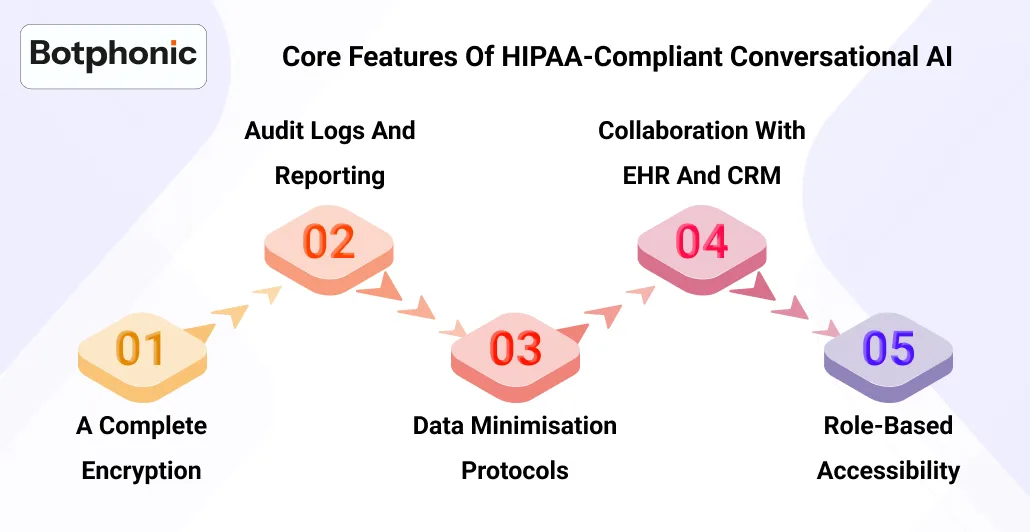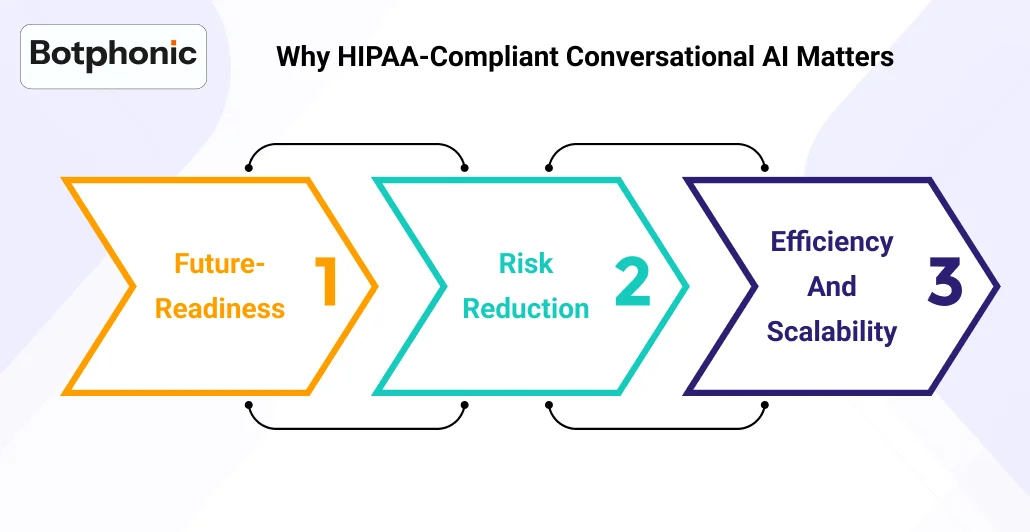
Summarize Content With:
Summary
Do you think that every clinic needs data security, or is it only necessary for large hospitals? I am working at City Care Hospital of the USA. Most of the time doctors are busy with paperwork, patients wait in a queue for appointment booking, and it is difficult for the admin department to provide accurate information on calls. Then finally we implemented an AI phone-calling system in our operation that reduces 90% of basic tasks, and we feel stress-free with our daily work; now we can focus on complex issues.
But still we were unable to raise efficacy, as the system lacks security; most patients declined the AI platform services. Do you think AI can work fast without compromising data privacy? Previously, I too had this question in my mind. But since I started leveraging HIPAA compliance in workflows, I enhanced our hospital productivity by 3x in just three months. So finally, I am feeling relieved as my workflows got automated without compromising data privacy. We have regained customer trust after applying HIPAA compliance; now patients feel comfortable in sharing information with us. Do you want to build the same trust with your customers? Read this blog thoroughly, which will help you build strong rapport with patients.
Introduction
The healthcare sector is digitizing quickly; by 2030, global AI spending is expected to reach $188 billion. Conversational AI plays a huge role in this massive transformation. But the big problem is patient data safety. How to follow HIPAA compliance in the healthcare sector? Can healthcare sectors make patient conversation safe in alignment with HIPAA compliance? Do you have these questions in mind? I too had confusion in my mind prior to applying the AI call assistant in my healthcare firm.
Previously my healthcare company was struggling with missed calls and appointment scheduling. I get 1000+ calls per day, out of which I can only reply to a few. I was unable to check doctor availability and provided either wrong or inadequate responses to my patients. Eventually, my hospital productivity was going down, as I didn’t have an organized system to handle huge calls daily. Then I started applying AI voice assistance in my workflow.
Although I automated 90% of my work, I am still struggling with data privacy concerns. Most of the patients are not comfortable with sharing confidential details with AI platforms. I reduced my stress level with AI platforms but am still struggling with productivity. If a patient gets leaked, who will be responsible for that—technology or the hospital? Are you struggling with data privacy concerns even after automating your workflows? Don’t worry!!! I have the best solution for you. I have discovered remarkable hospital productivity since I began implementing HIPAA conversational AI in my protocols.
HIPAA compliance sends a safe signal to patients, and they feel comfortable with sharing confidential information with the AI platform. In this blog I will discuss the HIPAA Conversation AI solution and how it helps you ease your workflows without stressing about compliance.
Understanding HIPAA and Its Role in AI Adoption
Do you know what the connection of AI with patient data protection ? Let’s understand it. HIPAA is a law designed in 1996 aiming to safeguard patient health information (PHI). That means healthcare sectors can’t share patient-sensitive medical data without taking patient authorization and security precautions. Healthcare sectors, business associates, and insurance companies should follow HIPAA rules in all steps of their medical practice. Let’s understand all the rules:
- Breach notification rule: If data gets leaked, authorities should notify patients immediately.
- Security rule: It offers administrative, technical, and physical protections for electronic PHI. Healthcare sectors should implement highly protected systems to avoid data breaches.
- Privacy rule: Helps you decide how to utilize and disclose PHI.
Core Features of HIPAA-Compliant Conversational AI

Let’s understand some of the core features of HIPAA AI virtual assistance:
1. A Complete Encryption
Do you think patient data will remain safe without encryption?? In the traditional system my team was stuck with work; we didn’t have adequate time to think about end-to-end encryption.
Mostly we indulged in mundane tasks that are boring and full of errors, unprotected, and time-consuming. By leveraging HIPAA-compliant AI voice assistance, our workflow got automated, and all interactions of patients are stored in a secure server.
With end-to-end encryption, you can ensure that all patients’ text, multimedia, and voice mails are secure with doctors. In this way, you can build a comfortable space for your patients and help them cultivate assurance in your services.
2. Audit Logs and Reporting
Don’t you think every activity of hospitals should be recorded to avoid misuse?? Agree? Previously, my company lost $10k because of not tracking all the activity of the hospitals. Do you think if your system lacks security, you will get into legal troubles in the future? It is highly indispensable for hospitals to leverage
HIPAA-compliant AI voice assistance to track all the illicit activities and detect any threat at the initial stage. By employing the HIPAA AI platform, I am feeling stress-free, as AI takes care of all hospital activities and alerts you before it turns more serious. In this way, my company cuts down on revenue on unnecessary legal complications and builds a safe zone for patients.
3. Data Minimisation Protocols
If your chatbots started asking unnecessary questions of customers, would your customers trust you? Previously, in my hospital, I discovered the patient churn rate is increasing because the system was asking unnecessary details from customers, which creates uncomfortable situations. If AI starts asking unneeded sensitive details of patients, they will not feel secure revealing information with you. Agree?
HIPAA-compliant conversational AI gathers only essential information from customers so that privacy remains intact and data leakage gets reduced. Since I started using the Data minimization protocol, it has helped me enhance patient confidence, and also it reduces liability to a great extent. AI platforms gather data that are essential and protect your firm from unnecessary legal troubles.
4. Collaboration with EHR and CRM
Do you believe that confusion results from dispersed hospital systems? Previously, my healthcare firm faced data breach issues, as the chatbots were not properly linked with crm and ems. We needed to transfer sensitive information manually. Do you agree that errors and vulnerabilities in the workflow are likely to occur if your system does not have security integration?
HIPAA-compliant AI voice assistant are seamlessly connected to CRM and EHR through secure APIs, eliminating the need for manual data handling. Since I started applying HIPPA conversation ai platforms, I feel less stressed. Now AI automatically updates the hospital records; all my hospital operations are encrypted and conform to adherence rules. Result? It saves time, reduces legal risk, and creates a safe and connected experience with patients.
5. Role-based Accessibility
Don’t you think that not all staff members need access to all patients’ details? Previously, my hospital encountered a big problem for not defining data access properly. All employees have surplus data about patient information that does not align with their work. They misused the data, and my hospital incurred legal penalties and revenue loss. Patients become skeptical of your services as a result.
And I and my team constantly stress about unauthorized access. Then we applied role-based access control in my AI system; this provides access only to authorized persons based on their roles. AI automatically assigns permission and blocks unauthorized access—this not only maintains compliance, but it also boosts my customer trust. Finally, I got relieved!
Why HIPAA-Compliant Conversational AI Matters

Let’s check out:
1. Future-Readiness
Future is digital, and healthcare is no exception. Initially I thought digital health and remote monitoring were feasible only for big medical facilities. But now my perception has been changed. Even patients sitting remotely are consulting doctors online. We will remain behind the competition if we don’t implement HIPAA-compliant AI systems.
Are you constantly stressing about how to remain abreast in the dynamic market? “How will your system automatically follow the new compliance?” I too had the same question in my mind before applying HIPAA.
Since I started using HIPAA-certified ai platforms, I have felt completely relaxed. It doesn’t bother me anymore if new regulation rules arise or digital-first care and remote monitoring scope increase; AI platforms will automatically adapt to it. It helps my firm build strong loyalty, as customers think we are not only running behind technology advancements but also considering customer data seriously. This boosts customer contentment as well as company productivity to the ultimate level.
Set up a HIPAA compliant conversational Al in no time
Connect with Botphonic2. Risk Reduction
In the past, I was always concerned about data breaches because even one mistake could wreck my company’s reputation. Initially i thought basic security measures were sufficient to run the healthcare company. But one day my company data got leaked, and then I realized data breaches are not only about losing money; they’re also about losing customer trust, which takes years for any business to build. Agree??
My team was constantly stressed about authorized access and company data safety. This nervousness was a permanent guest in my hospital. Are you still constantly worrying about it?? Then start implementing hippa complaint AI call assistant software!! AI platforms track all the operations related to data and block the illicit activity before it becomes more serious. This reduces the chances of legal penalties and risk, and patients feel comfortable sharing sensitive information with your platform. Now I feel compliance is not just a legal checkbox; this is insurance for my hospital’s survival and growth.
3. Efficiency and Scalability
In the traditional hospital system, I had to involve all my staff members to resolve even small queries of customers, like appointment booking, reminders, test report updates, and responding to simple FAQs. Mostly doctors and nurses are indulged in regular work; they don’t get sufficient time to handle critical patients. Since I started using the conversational AI platform, we can easily manage repetitive and routine work.
AI can handle all our routine work. Clinicians can now devote themselves to critical patient cases. But you should also ensure that the system adheres to HIPAA compliance. Efficiency does not matter if you are not paying attention to data security and legal benchmarks. AI platforms provide quick responses to patients and reduce the workload of staff. Now, I and my team are feeling relaxed as both productivity and compliance are running in tandem.
Conclusion
HIPAA-compliant conversation AI is not just a technology tool—it is a secure, efficient, patient-focused healthcare communication backbone. When we incorporate conversational AI with strong compliance, then healthcare providers get both automation and accountability.
By using conversational AI in patient engagement , you can keep the patient more engaged, reduce expenses, and maintain security and compliance in your workflows. Businesses implementing HIPAA compliance in AI platforms will emerge as market leaders as the healthcare industry develops.
I hope the above blog provides you beneficial insights on HIPAA compliant conversation AI and how leveraging it makes your system secure and free from threats.
Ready to build secure, smart, and empathetic healthcare communication?? Connect with Botphonic!!!

